

Simón Bolívar - Madoka Rune Wiki. Simón Bolívar Monument, Sixth Avenue entrance to Central Park, New York City Simón Bolívar Memorial Monument, standing in Santa Marta, Colombia Equestrian statue of Bolívar on Bolívar Square, Caracas Simón José Antonio de la Santísima Trinidad Bolívar y Palacios (born July 24, 1783 in Caracas , Venezuela ; died December 17, 1830, in Santa Marta, Colombia ) was a leader of several independence movements throughout South America , collectively known as Bolívar's War.
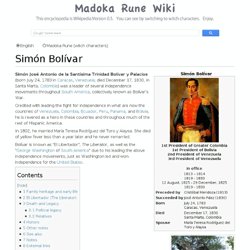
Credited with leading the fight for independence in what are now the countries of Venezuela , Colombia , Ecuador , Peru , Panama , and Bolivia , he is revered as a hero in these countries and throughout much of the rest of Hispanic America. In 1802, he married María Teresa Rodríguez del Toro y Alaysa. Bolívar is known as "El Libertador", The Liberator , as well as the " George Washington of South America " due to his leading the above independence movements, just as Washington led and won independence for the United States .
Notes. Evo Morales. Juan Evo Morales Ayma, (born October 26, 1959), popularly known as Evo (Spanish pronunciation: [ˈeβo]), is a Bolivian cocalero activist and politician, who has served as President of Bolivia since 2006.
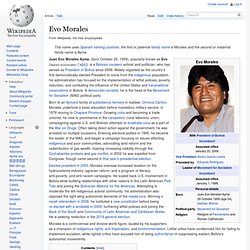
Widely regarded as the country's first democratically-elected President to come from the indigenous population, his administration has focused on the implementation of leftist policies, poverty reduction, and combating the influence of the United States and transnational corporations in Bolivia. A democratic socialist, he is the head of the Movement for Socialism (MAS) political party. Born to an Aymara family of subsistence farmers in Isallawi, Orinoca Canton, Morales undertook a basic education before mandatory military service, in 1978 moving to Chapare Province.
Growing coca and becoming a trade unionist, he rose to prominence in the campesino (rural laborers) union, campaigning against U.S. and Bolivian attempts to eradicate coca as a part of the War on Drugs. Political Rise[edit] Identity in the Bolivia of Evo - ThePrisma.co.uk. This will be the title of a talk by Rosaleen Howard on July 5th.
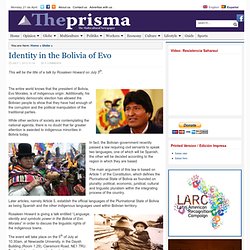
The entire world knows that the president of Bolivia, Evo Morales, is of indigenous origin. Additionally, his completely democratic election has allowed the Bolivian people to show that they have had enough of the corruption and the political manipulation of the traditional parties. While other sectors of society are contemplating the national agenda, there is no doubt that far greater attention is awarded to indigenous minorities in Bolivia today.
In fact, the Bolivian government recently passed a law requiring civil servants to speak two languages, one of which will be Spanish, the other will be decided according to the region in which they are based. Antonio José de Sucre. Antonio José de Sucre y Alcalá (Spanish: [anˈtonjo xoˈse ðe ˈsukɾe j alkaˈla]; 1795–1830), known as the "Gran Mariscal de Ayacucho" (English: "Grand Marshal of Ayacucho"), was a Venezuelan independence leader.
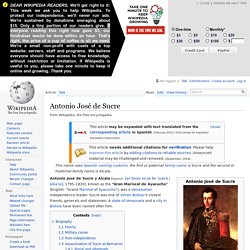
Sucre was one of Simón Bolívar's closest friends, generals and statesmen. A state of Venezuela and a city in Bolivia have been named after him. Biography[edit] Family[edit] The aristocratic Sucre family trace its roots back to origins in Flanders. Military career[edit] Simón Bolívar. Simón José Antonio de la Santísima Trinidad Bolívar y Palacios Ponte y Blanco (24 July 1783 – 17 December 1830), commonly known as Simón Bolívar (Spanish pronunciation: [siˈmon boˈliβar]), was a military and political leader.
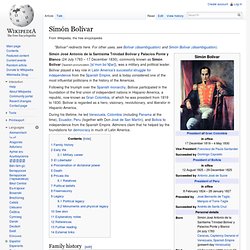
Bolívar played a key role in Latin America's successful struggle for independence from the Spanish Empire, and is today considered one of the most influential politicians in the history of the Americas. Following the triumph over the Spanish monarchy, Bolívar participated in the foundation of the first union of independent nations in Hispanic-America, a republic, now known as Gran Colombia, of which he was president from 1819 to 1830. Bolívar is regarded as a hero, visionary, revolutionary, and liberator in Hispanic-America. During his lifetime, he led Venezuela, Colombia (including Panama at the time), Ecuador, Peru (together with Don José de San Martín), and Bolivia to independence from the Spanish Empire. Family history[edit] Early life[edit]